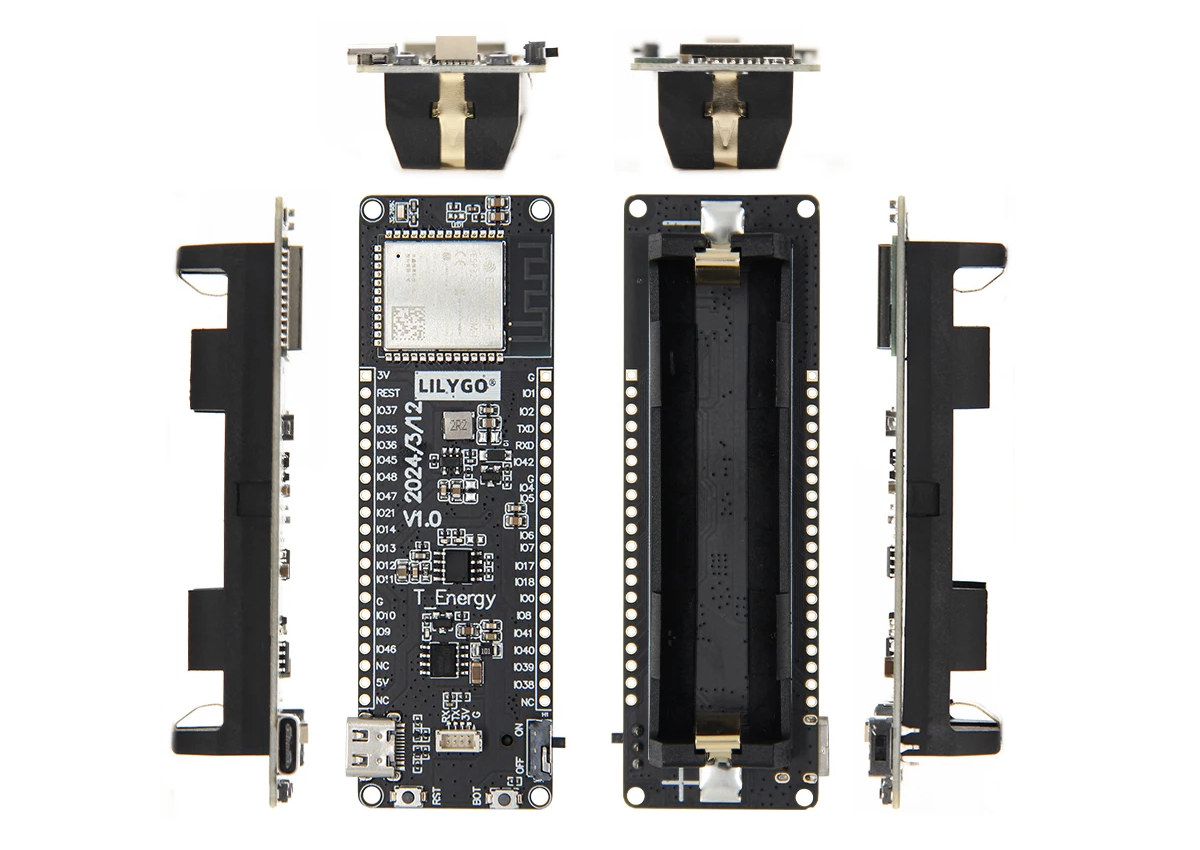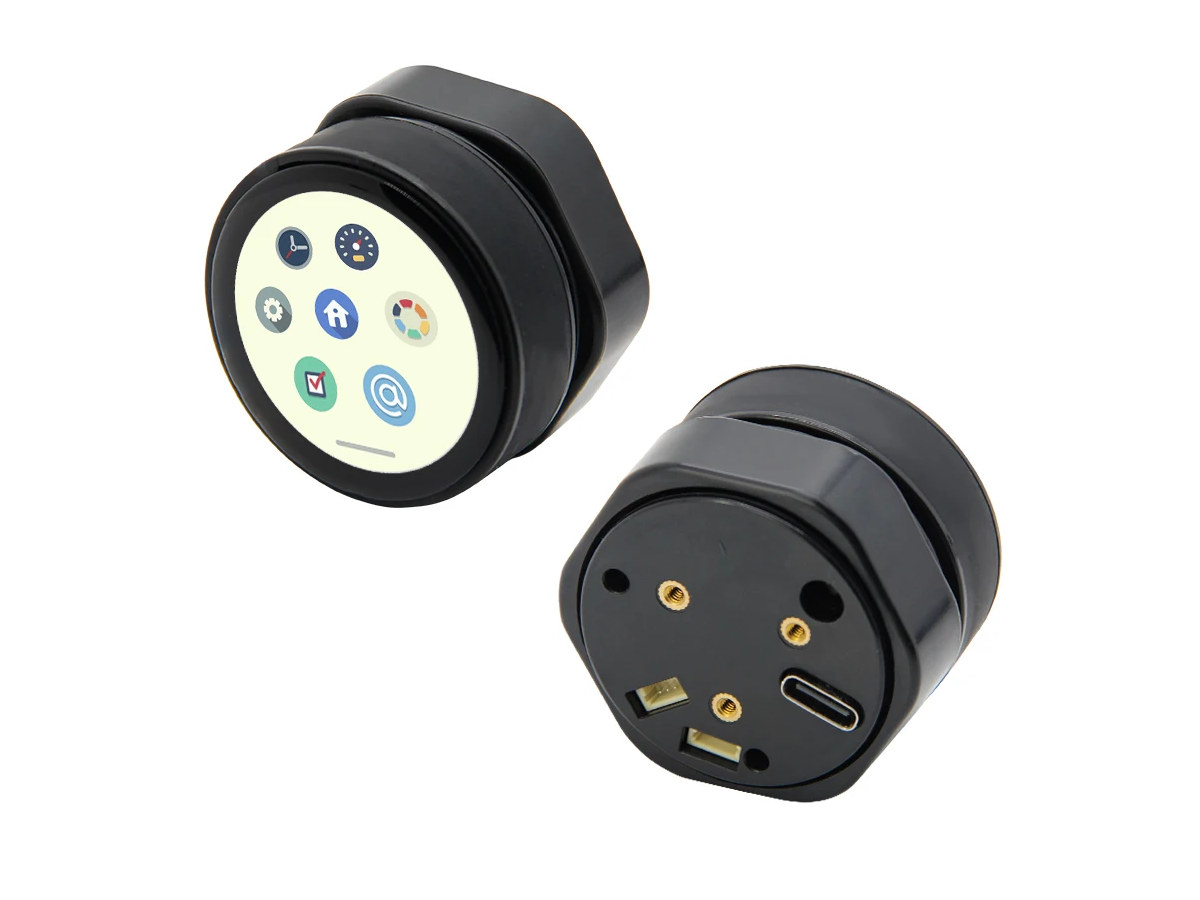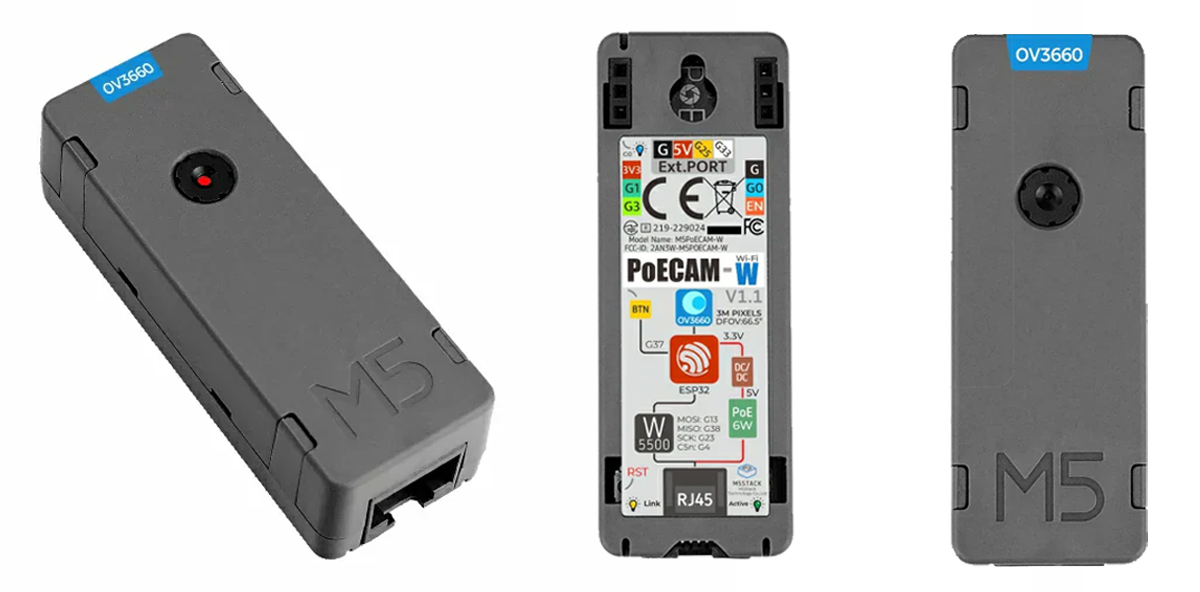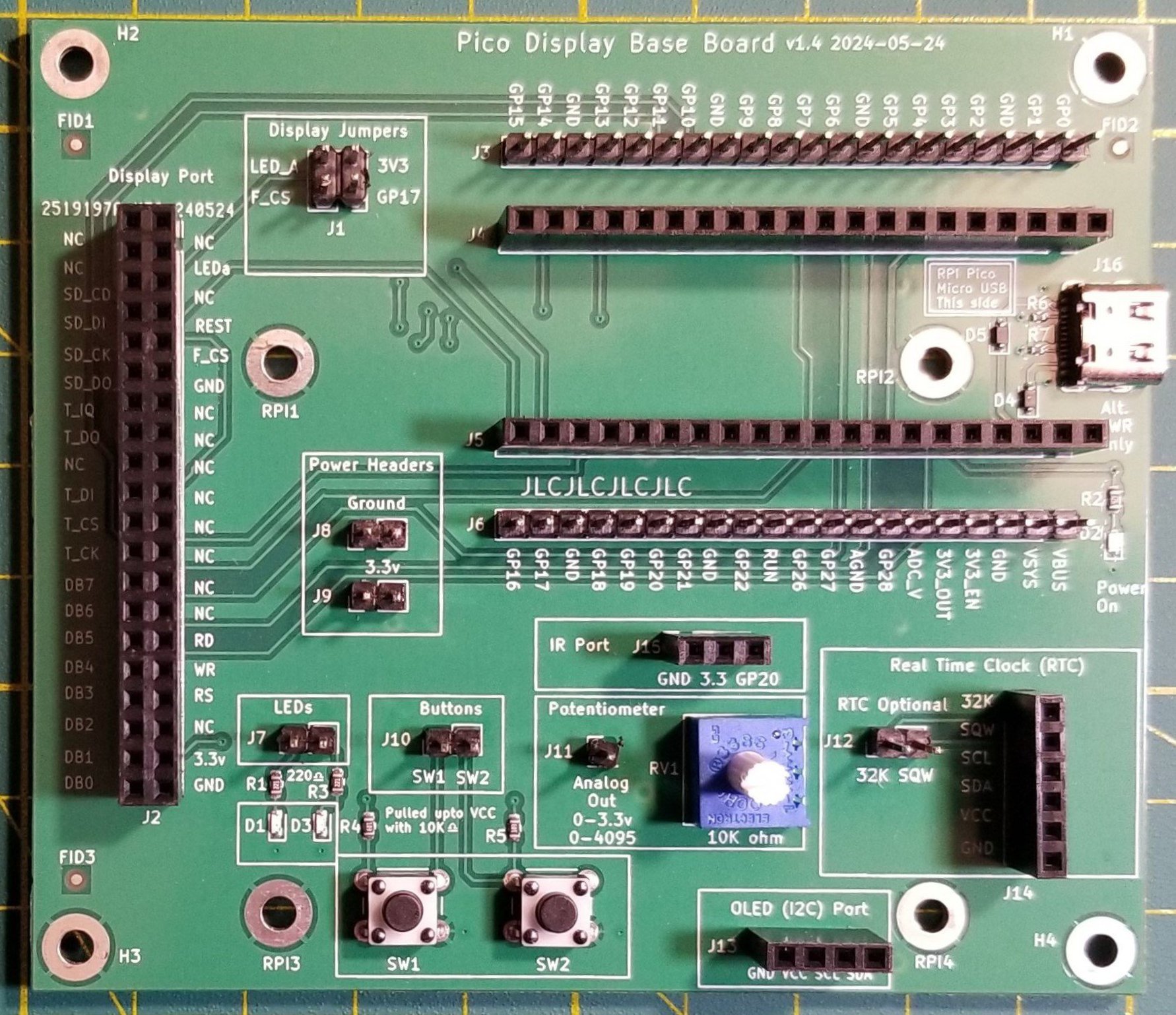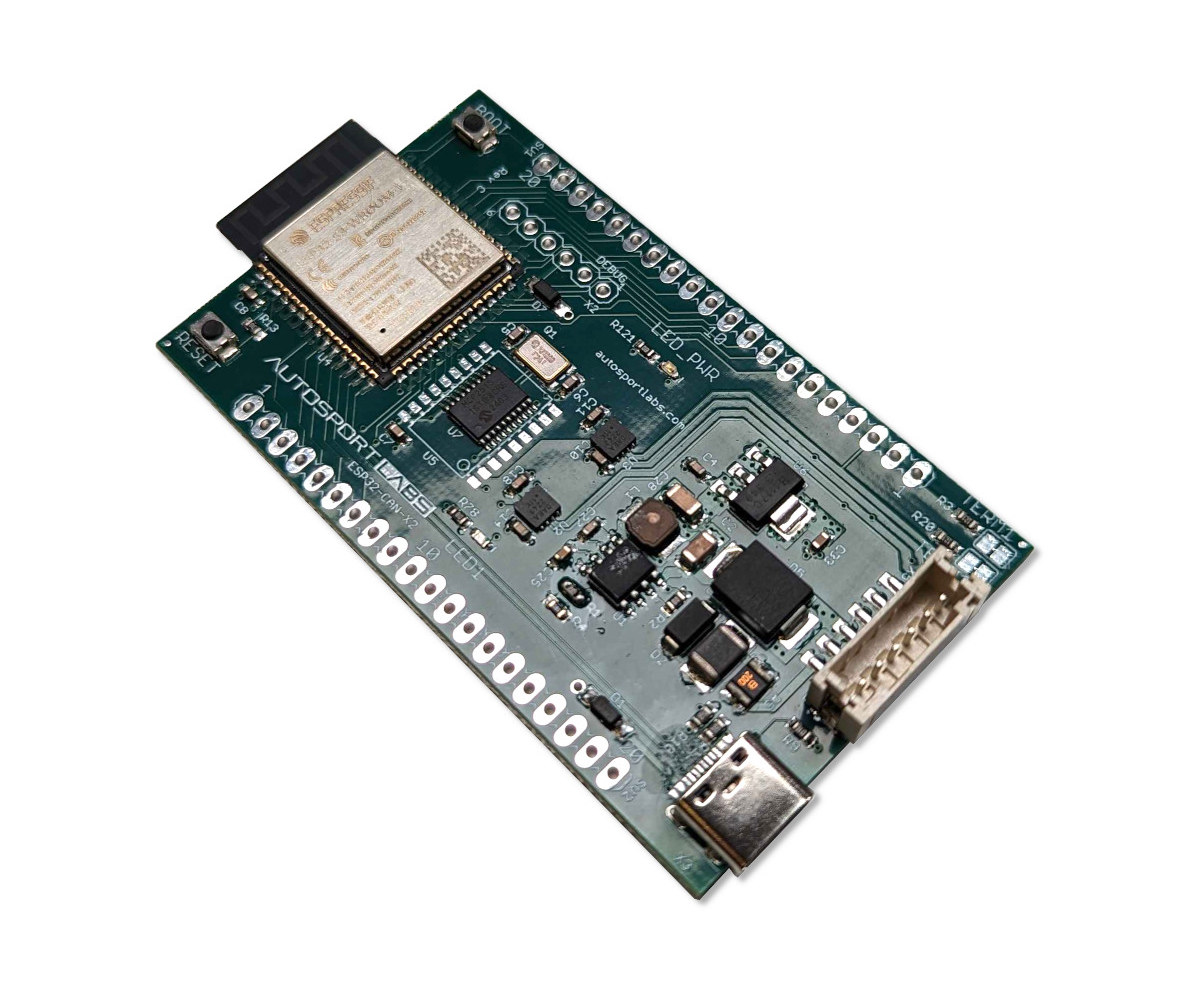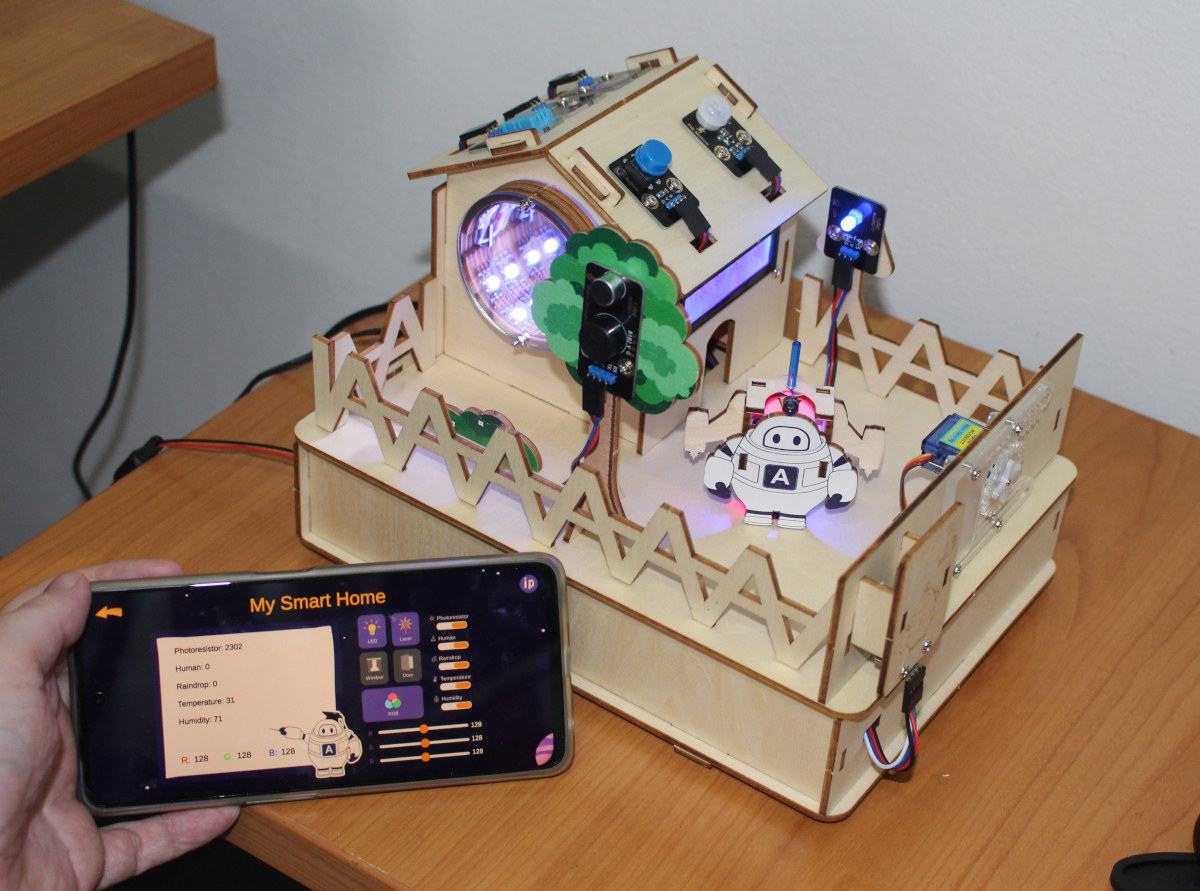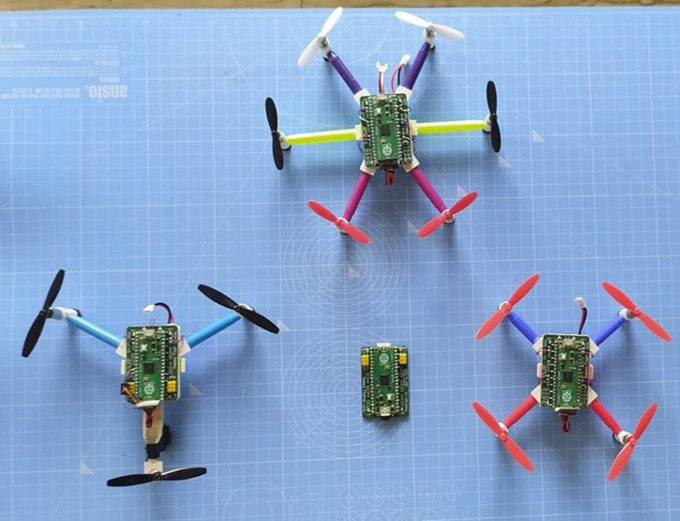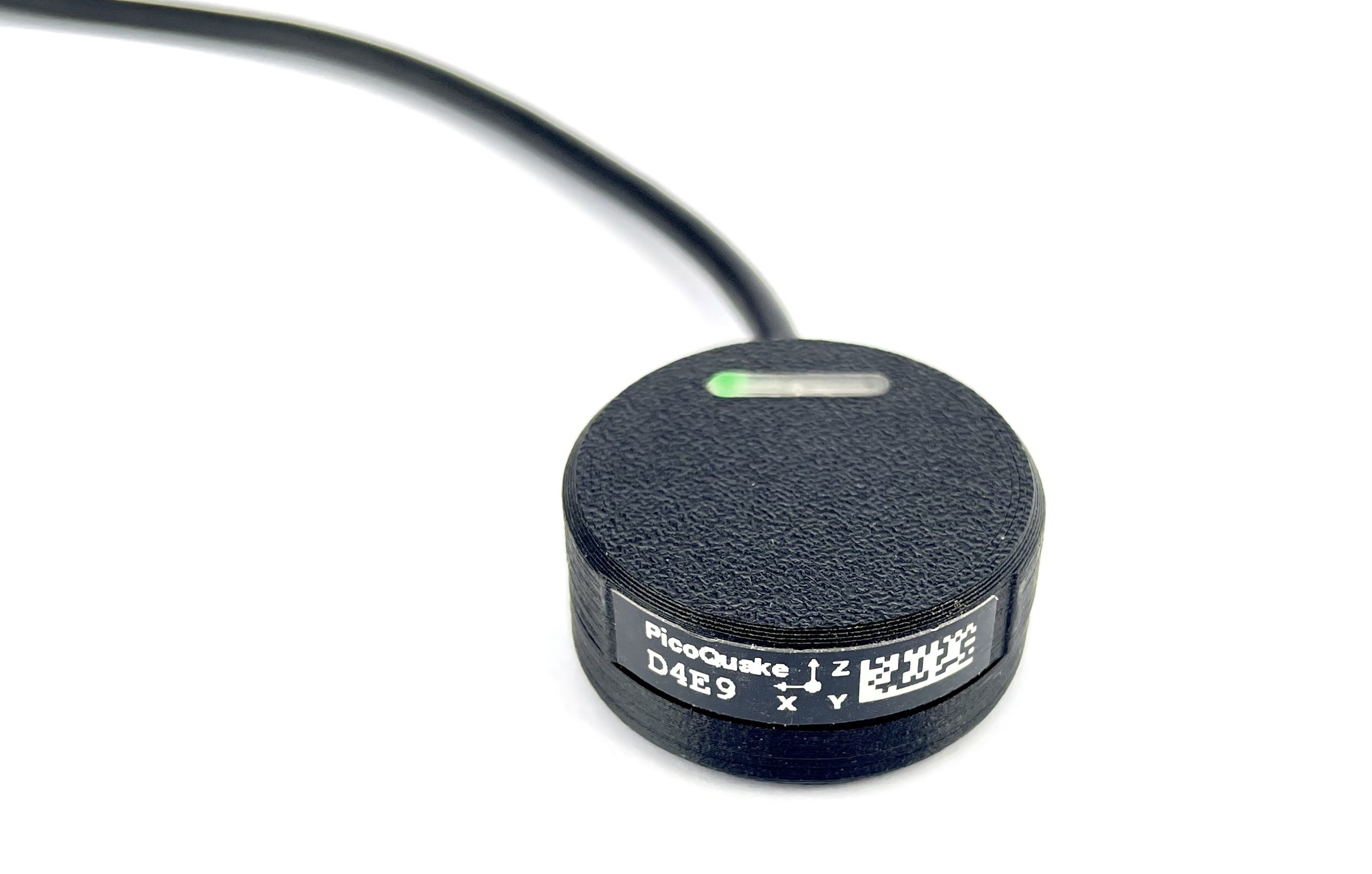LILYGO T-Energy-S3 is an ESP32-S3 WiFi and Bluetooth IoT board with an 18650 battery holder, a USB-C port for charging and programming, and plenty of I/Os thanks to two 20-pin GPIO headers and a Qwiic connector. We’ve already covered a large number of ESP32-S3 boards and products, including some designs for battery operation such as the Tokay Lite AI camera board, LILYGO’s T7-S3 board, and Smart Bee Designs’ Bee S3 board among others. But that usually means providing a 2-pin connector and charging circuitry to connect a LiPo battery, but the T-Energy-S3 ESP32-S3 board works directly with an off-the-shelf 18650 rechargeable Lithium battery. T-Energy-S3 specifications: Wireless Module – ESP32-S3-WROOM-1-N16R8 Espressif Systems ESP32-S3R8 – Dual-core Tensilica LX7 @ up to 240 MHz with vector instructions for AI acceleration, 512KB RAM, 8MB PSRAM Storage – 16 MB flash Wireless – 2.4 GHz WiFi 4 and Bluetooth PCB antenna USB – 1x USB […]
ESP32-S3 rotary encoder features 1.2-inch AMOLED touchscreen display and Qwiic connectors
LILYGO T-Encoder-Pro is a rotary encoder based on Espressif Systems ESP32-S3 WiFi and Bluetooth SoC, equipped with a 1.2-inch AMOLED with touchscreen support, and two Qwiic connectors for expansion. LILIGO T-Encoder was introduced in 2022 with ESP32 WiFi and Bluetooth SoC and a few GPIOs that enabled it to be fitted on a 2-key keypad shield. The LILYGO T-Encoder Pro has a completely different design with a more advanced ESP32-S3 SoC, an integrated touchscreen display, and GPIOs are now exposed through Qwiic connectors instead of headers. LILYGO T-Encoder-Pro specifications: Wireless SoC – Espressif Systems ESP32-S3R8 CPU – Dual-core Tensilica LX7 @ up to 240 MHz with vector instructions for AI acceleration Memory – 512KB RAM, 8MB PSRAM Wireless – 2.4 GHz WiFi 4 and Bluetooth Storage – 16 MB flash (W25Q128) Display – 1.2-inch rounded AMOLED with ∅390mm resolution via SH8601A-W14-T06 QSPI controllers; CHSC5816 I2C touch and rotary encoder chip […]
M5Stack M5PoECAM-W V1.1 – A ESP32-powered PoE camera module with 3MP OV3660 sensor
M5Stack M5PoECAM-W V1.1 is a PoE camera module built around the Espressif ESP32 MCU and WIZnet W5500 Hardwired TCP/IP embedded Ethernet controller. The W5500 along with a PoE controller takes care of ethernet and PoE power whereas the 3MP OV3660 sensor is responsible for video and photos. The camera features a wide 65° field of view which makes it suitable for applications like image monitoring and remote data acquisition. Previously we have covered similar camera modules like the LILYGO T-Camera-Plus-S3, Sipeed MaixCAM, and Luxonis OAK-D Series 2 cameras with the latter also having a PoE option. Feel free to check those out if you are interested in the topic. M5Stack M5PoECAM-W V1.1 specifications ESP32-D0WDQ6-V3 wireless module SoC – Espressif ESP32-D0WDQ6-V3 CPU – dual-core Xtensa LX6 processor clocked at up to 240MHz Memory – 520KB SRAM Connectivity – 2.4 GHz 802.11n WiFi 4 and Bluetooth v4.2 BR/EDR and BLE Memory – […]
The Pico Display Base Board offers a simpler way to create Raspberry Pi Pico LCD projects
The Pico Display Base Board is a printed circuit board from Applying Microcontroller Solutions that provides a platform for building Raspberry Pi Pico-based display projects. It works with a Raspberry Pi Pico board and an LCD screen based on the Solomon Systech SSD1963 display controller. The Pico Display Base Board features a 40-pin header (Display Port) which connects to GPIO on the Pico to provide an 8-bit parallel interface for the display and SPI pins for the touchscreen and integrated SD card. It supports various display sizes from 4.3 inches up to 7 inches. Displays up to five inches can be powered directly by the Pico. A jumper block on the board can be used to pass power to the LCD and wire the display’s optional flash chip to the Pico. A USB-C port on the board can provide an alternative power source for larger displays. It also has male […]
Autosport Labs ESP32-CAN-X2 board combines two CAN bus transceivers with automotive-grade power supply
Autosport Labs, a company that makes products for motorsport acquisition and real-time telemetry, has launched the ESP32-CAN-X2 board with an ESP32-S3 microcontroller, two CAN bus interfaces, and an automotive-grade power supply with a 6V to 20V DC input range. ESP32 boards with CAN Bus have been around for years starting with the Olimex ESP32-EVB Board which we covered in 2017, and followed by boards such as the CAN32 board, CanLite ESP32, or RejsaCAN-ESP32-S3. The ESP32-CAN-X2 adds another option with ESP32-S3 and two CAN Bus interfaces. ESP32-CAN-X2 board specifications: Wireless module – ESP32-S3-WROOM-1-N8R8 MCU – ESP32-S3 dual-core Tensilica LX7 microcontroller up to 240 MHz with 384KB ROM, 512KB SRAM, 16 KB SRAM in RTC Memory – 8MB PSRAM Storage – 8MB flash Wireless – WiFi 4 and Bluetooth LE 5 PCB antenna USB – USB Type-C port for flashing and power CAN Bus 6-pin header for 2x CAN V2.0B communication 1x […]
ACEBOTT QE007 review – An ESP32-based Smart Home STEAM education kit for 8+ years old kids
ACEBOTT QE007 ESP32-based Smart Home Starter Kit is a STEAM (Science, Technology, Engineering, Arts, and Maths) education platform that involves story reading, assembling a wooden house with various electronics sensors wired to an ESP32 board, and learning about electronics concepts (such as voltage and current) and coding with the Arduino IDE through an 18 lesson course. ACEBOTT has various STEAM education kits, and the company sent us the QE007 “IoT Smart Home Starter Kit” for evaluation and review. So I’ll go through an unboxing, report my experience with the assembly process, and the Arduino tutorials by going through some of the eighteen lessons. ACEBOTT QE007 unboxing The kit comes in a nice-looking retail that reads “ACEBOTT Explorer Series QE007” and “ACEBOTT IOT Smart Home Started Kit”. The front of the package also highlights its a STEAM education kit designed for 8+ years old kids. The bottom side gives the backstory […]
PiWings 2.0 is a tiny drone based on Raspberry Pi Pico and ESP8266 WiFi module (Crowdfunding)
SB Components’ PiWings 2.0 is a small drone combining a Raspberry Pi Pico with an ESP8266 WiFi module (ESP-12E) for wireless connectivity, and designed for STEM education and drone enthusiasts. The PiWings 2.0 board supports up to six motors and four servos, includes a 6-axis IMU for auto-leveling, and features I2C, SPI, UART, and GPIO expansion ports for custom sensor and/or actuator support. The drone itself is offered with three, four, or six rotors. PiWings 2.0 key features and specifications: Microcontroller board – Raspberry Pi Pico with Raspberry Pi RP2040 dual-core Cortex-M0+ microcontroller, 264KB SRAM Wireless module – ESP-12E (ESP8266) WiFi module for iBus support Motor Drivers – 6 channels (3A DC) Servo Motors – 4 channels USB – 1x micro USB port (on Raspberry Pi Pico) Expansion – I2C, SPI, UART, GPIO ports Sensor – On-board 6-axis IMU (MPU6050) for auto-leveling Misc – 4x RGB LEDs Power Supply 3V […]
PicoQuake USB vibration sensor is based on the RP2040 MCU and the ICM-42688-P vibration sensor
The PicoQuake is a USB vibration sensor with a MEMS accelerometer covering a wide range of vibrations. It is capable of capturing vibrations in the low-frequency range (tall buildings, bridges) to the high-frequency range (motors, industrial machinery). It can operate as a standalone device and connect to a computer via a USB cable. Furthermore, it is based on the Raspberry Pi RP2040 microcontroller and uses a low-noise MEMS inertial measurement unit, the TDK InvenSense ICM-42688-P, which combines a 3-axis gyroscope and a 3-axis accelerometer. The low-noise IMU sensor used enables the PicoQuake to profile vibrations of very low magnitude. The PicoQuake sensor is a product from Slovenian maker, PLab, just like the FOCn driver module we took a look at recently. Potential use cases for the PicoQuake include optimizing brushless DC motor vibrations (important in small mobility products such as electric bikes and scooters), tracking trackpad clicks, smart home automation, […]


